Jen Bailey I lost my grandmother, Harriet, at the end of August. She was my last living grandparent, and my mom’s mom and my mom passed away in 2016. Part of missing her and part of the grief that I think is really palpable for me now is that it’s so much going on—there was a book release, my baby turned one. I hadn’t really sat with the weight of my grandmother’s loss.
Learning what it means to mother in the absence of the mothers that were most formative in my life, I don’t have the ability to just pick up the phone and call and ask them a question. I can hear their voice in sort of the cosmic spiritual sense, and I know that they are ancestors guiding me. But sometimes, I just really want to call my granny. I really want to call my mama when I’m at my wit’s end.
Dacher Keltner I’m Dacher Keltner. Welcome to The Science of Happiness.
Part of life is experiencing pain and loss. And sometimes we find meaning in it.
This week, we’re exploring an exercise shown in laboratory studies to help us make sense of grief, and find meaning during challenging times.
We’re joined by Reverend Jennifer Bailey, a minister in Nashville, Tennessee, and the author of To My Beloveds: Letters on Faith, Race, Loss, and Radical Hope. She’s also the founder and executive director of Faith Matters Network, a women-led organization supporting activists and faith leaders.
Reverend Jen tried an expressive writing practice for our show after losing two powerful women in her life, her mother and grandmother.
Later we’ll delve into some of the research behind this type of free-writing, and share a couple of tips on how to do it yourself.
More after this break.
Welcome back to The Science of Happiness. I’m Dacher Keltner.
Grief can take many forms, and there are just as many ways to help us move through it in a healthy way.
I’m joined today by Reverend Jen Bailey. She tried an expressive writing practice to help process the loss of her mother and grandmother.
Reverend Jen, it’s a privilege to be in conversation with you.
Jen Bailey Thank you so much for having me.
Dacher Keltner I want to congratulate you on your beautiful book, To My Beloveds: Letters on Faith, Race, Loss, and Radical Hope. In it, you write letters of love and support to fellow faith leaders and activists.
And before we get into the writing practice you did today, I’m just curious, what did writing these letters give to you?
Jen Bailey So I think what happens for a lot of us is that we get really well versed in narrating the story of our lives in a particular way. And so, in writing these letters, I got to touch back in with parts of myself that I hadn’t explored in quite some time and have the cover through this medium to do that in a way that was deeply honest and with myself.
But, I actually don’t like to write. It took me a long time to write this book, my publisher would tell you stories, right? And it’s partially because for me, writing is the closest that I get to the most authentic part of my own voice. And, I don’t know about your listeners, but sometimes getting really real with ourselves is one of the most difficult things that we can do.
Dacher Keltner I hear you. When I started writing this book on awe, it was while grieving the loss of my brother Roph. There was something, almost a discovery about where I was in life in writing about awe and loss.
And that is really what this expressive writing practice is about that you tried for our show. You focus on an emotional challenge, one that you’re ready to face, and you just free-write about it, non stop, for 20 minutes. No worrying about spelling or grammar. So you’re an accomplished writer—what was it like to change your style and just free-write?
Jen Bailey Oh, it was so hard. I am the type of person and writer that likes to get a sentence perfect or as close to perfect as possible. And so, I think there was a part of this exercise that was almost like, I don’t want to call it an out of body experience, but it gave me the permission for imperfection, which is something that I don’t often give myself permission for, especially when it relates to my writing and the release of control, which is one of my own spiritual struggles that I’m constantly attending to.
So, one of the many gifts of this exercise is that it forced me to just keep going and not evaluate and not analyze and not critique what I was writing, but allowed myself just to say what I needed to say and that it didn’t need to be perfect. It didn’t need to be polished. It could just be the truth. And, I don’t know how often in my life I give myself free rein just to access the truth of my experience without immediately pointing to analysis or critique of that truth.
Dacher Keltner I hear you.
Jen Bailey One of the things that doing this exercise helped me recognize was just how much what I’ve been calling delayed grief was living in my body. So, I lost my grandmother, Harriet, who I write about in the book, at the end of August. She was my last living grandparent, and my mom’s mom and my mom passed away in 2016.
And so the first thing that I ended up writing—first words that came out during this exercise—was, “I miss my granny.” It was really striking to me how that first line opened up a space for me to tend to the other areas of my life where I had either delayed the grieving process because I didn’t feel like I had the space or permission to fall apart because I had to keep it together for others.
Dacher Keltner I hear you. And when you did that over the course of the four days of the exercise beginning with, “I miss my granny.” Where did the writing take you?
Jen Bailey The writing took me from I miss my granny to—and this probably tells you a lot about my own journey—to a place of prayer. It struck me that I went from, in the exercise, “I miss my granny” to a space of gratitude releasing that which I couldn’t control, believing that I trust in a spiritual, divine presence that is big enough to hold my grief. That is big enough to hold my sorrow. That is big enough to hold my anger. I think I got in touch with just how angry I am that my mom died at sixty three.
Dacher Keltner Do you mind saying what the prayer was?
Jen Bailey Well, it took on a lot of different directions. It became less of a formal prayer and more a direct conversation with God. I’m looking back as we’re talking over some of what I was writing was, you know, “Come what may I’ll trust you, God. I’m handing this grief over to you because I don’t know what else to do, so help me to do what’s right. Help me to do what is in alignment with your will. Help me to see beyond the noise to the heart of the matter. What a gift this time is. I love you!” So, very much a discourse with God.
Dacher Keltner In the end of one the days that you wrote, you know, beginning with, I miss my granny” and kind of leading you into this space of prayer. I know sometimes in studies people will feel sad and they’ll feel anxious and they’ll feel destabilized, but feel this sense of something new coming out of it and I’m curious what it was like for you.
Jen Bailey I think what this exercise helped me to do was perhaps get back in touch with my own deep humanity in a way that I had kind of walled off and maybe hadn’t done so since writing the book. So getting back in touch with a particular vulnerability within myself, with uncertainty, with my own sense of, you know, insecurity, right? All of those things that we don’t name aloud and folks who are called leaders are often not allowed access to the possibility of mistakes that I had made. And that was a gift. I’m still not quite sure what to do with it.
I know it’s a gift. I know, I know it’s a gift. Sometimes we receive gifts we don’t want, but I know it’s a gift. And, my hope is to bring this practice back into sort of a regular part of my own spiritual work and discipline because like I said, I don’t like to write. I’m not a fan of it. It gets too personal.
Dacher Keltner But that’s exactly the right moment of writing is the voice and the personal quality and the vulnerability, like you said. What an interesting reflection on the exercise.
You know, in your book you return to, I think one of the most important questions and themes of our times of the pandemic—people are feeling a real sense of grief and loss and disorientation and you have the sense or argue in the book or just talk about in the book about how grief can be composted into hope. So, help us think about how do we do that? How do you think maybe the practice is one way? And how do you think about that more generally?
Jen Bailey I think that the quest that I’ve been on, whether consciously or not, perhaps for my entire life, is thinking about how we take that which is declining, is dead and dying, and use it to fertilize that which wants to emerge and come to pass in this moment. And watching my grandmothers in particular, both Black women from the south—one from Georgia, one born in Arkansas—both were fantastic gardeners. Fantastic gardeners. They grew fruits and vegetables and flowers. My grandmother, Harriet in particular, was gifted in this way.
Dacher Keltner Hands always in the dirt.
Jen Bailey Hands always in the dirt. And, you know, many a summers we’d go spend time with her and we’d always leave with like huge coolers full of food that would nourish us throughout the winter months. So, when I think about the women in my family as composers, right—I literally saw what they did with scraps of food to fertilize the soil. I continue to hold close to me the desire to to take that in our lineage, our past that is nourishing, right? Because I’m not a believer in tossing everything out that is old. I think that there’s so much that we have to learn.
But I also am not committed to holding on to those practices, those theologies, those ways of being in the world that are death-dealing, that rather than calling people to greater openness or love, force people into a space of othering or disengagement, right? Or at their worst, hatred. And so, I wrestle in the book and in my own life with discerning that which is worthy of us continuing to pass on and nourish this emergent space even as we are looking to the uncertainty of a future that has not yet come to pass.
Dacher Keltner Reverend Jen, I have a final question for you. You’ve written letters that are part of a book and you are part of a long tradition of expressive writing and finding hope in it and composting like you talked about it. And I’m curious, you know, just going forward, how you might use this expressive writing practice in your own work?
Jen Bailey Mmm, you know, it’s so interesting. I have already thought about ways to incorporate this into sort of my own personal spiritual practice. So thinking about setting aside time every so often—time feels like a commodity that I don’t have much of these days. But really committing to myself, even just on a monthly basis, to doing one day of expressive writing for 20 minutes, because I do think it is a really powerful way to get back in touch with myself in a way that I don’t often do.
And I’ll share—I’ve already started sharing this practice with others. I led a retreat just this week for a group of Black women social entrepreneurs, and we were talking about generational healing, personal healing, and collective healing, and so on the theme of personal healing, I introduced this expressive writing exercise in and linked people back to the prompt on the Greater Good website. And folks have already begun sharing with me how transformative and powerful it was. Again, particularly, I think, for folks who in this case, Black women who aren’t allowed the space often to like, just tend to what’s going on within themselves because they’re trying to be strong or do everything for everybody else in my experience. And so, I’m already thinking of ways and dreaming and scheming how to get other sisters in the struggle to do this work alongside me.
Dacher Keltner Well, I hope we get to hear some of those voices someday. That sounds like one of the best extensions of this work. Reverend Jen Bailey, thank you again for being in conversation. Thanks for being on our show.
Jen Bailey Oh, thank you so much for having me.
Dacher Keltner Up next, more on the science behind using expressive writing to compost our grief.
Matthew Stapleton We are interested in the stories that people tell about themselves and how those stories provide healing.
Dacher Keltner More after this break.
Welcome back to The Science of Happiness. I’m Dacher Keltner.
We’ve been exploring a type of free-writing called Expressive Writing that’s been shown in numerous studies to enhance physical and mental health during challenging times.
You choose a challenging life-event and you write about it for 20 minutes a day, for four days straight.
We know expressive writing can support us during difficult times but can it change the way we show up to face all of life’s challenges?
Hui Michelle Zhang So our hypothesis: expressive writing is particularly beneficial for those emotions and thoughts related to a specific event and later, eventually, they may have this sense of mastery that can be transferred to other different situations.
Dacher Keltner That’s Hui Zhang, a psychology professor at Westfield State University. She and her husband Matthew Stapleton, a psychology professor at Springfield College, did an experiment on how expressive writing affects our thoughts and feelings toward a specific event, like losing someone you love.
They recruited one hundred and twenty college students to their lab who had experienced at least two distressing events in their lives.
Matthew Stapleton The death of a family member, such as a grandmother, parents, or cousins.
Dacher Keltner They also talked about sickness of family members, their own illness, academic difficulties since they were students…
Matthew Stapleton …financial difficulties and relationship troubles.
Dacher Keltner They asked some of the students to write about one of those difficult experiences, and others to write about something interesting. Anything at all.
Hui Michelle Zhang Like shopping on Black Friday and going to a concert, learning to ride a bicycle…
Dacher Keltner Everyone wrote for ten minutes straight, and then took a ten minute break.
Then, they wrote for another ten minutes. Hui and Matthew wanted to see if the people who had written about a distressing event felt better about that event than those who had just written about something interesting. So they also gave everyone a list of twenty emotions and asked them to rate how much they felt each one.
Hui Michelle Zhang Feelings of strength and being determined, being passionate, excited, interested, enthusiastic. We also measured the negative emotions, including being scared, ashamed, and jittery.
Dacher Keltner Overall, people felt fewer negative emotions toward a challenging event after they wrote about it and they also felt more emotionally strong.
Hui Michelle Zhang Being strong, determined, proud, inspired, and active—so these emotions about self concept.
Dacher Keltner In other words, they felt like they had more agency in the world.
Hui Michelle Zhang In expressive writing, when we look at the stories from a self regulation perspective, they gradually develop a more positive narrative about themselves.
Dacher Keltner The students had begun to reframe the story of what happened to them with themselves as the hero who persevered.
Hui Michelle Zhang So it’s more about how to construct a more positive sense of self through the expressive writing.
Dacher Keltner When it comes specifically to grief, Matthew says expressive writing can give us a normalized way to reconnect with deceased loved ones.
Matthew Stapleton And I would encourage the listeners that are grieving to see it in that literal kind of way. Reconnecting through these means with a deceased loved one can be very meaning-making.
Dacher Keltner No matter the challenge we write about, it can help us reconstruct the narrative of our lives in a way that emphasizes our strengths and resilience.
Hui Michelle Zhang Doing the writing is not just a recording of what happened today. It’s more about what kind of meaning we give to these experiences and how that relates to ourselves.
Matthew Stapleton So new life from something that’s dead—I think that’s a good spiritual metaphor. And seeing the connection between us all.
Dacher Keltner On our next episode of The Science of Happiness, we look at expectations—what happens when they’re too low, too high, when we have none—and how to find the balance.
Julie Santos We invited some friends over for coffee and my parents had bought fresh bread and the bread was warm. And, they flipped out. I mean, they were like, “Oh my God, the bread is warm! It’s so good!” And then my mom had butter and they were like, “Butter!”
I asked my mom’s friend, I said, “I’m just curious. Like, what is the excitement about?”
And she goes, “You know, they invited me for coffee. I wasn’t expecting, like, bread.”
Dacher Keltner I’m Dacher Keltner. Thanks for joining us on The Science of Happiness.
Do you have a daily or weekly happiness practice? We’d love to hear it. Email us at happinesspod@berkeley.edu or use the hashtag happinesspod.
Thanks to our Executive Producer of Audio, Shuka Kalantari, our producer, Haley Gray, Associate producer Kristie Song, Sound designer Jennie Cataldo of Accompany Studios, and editor in chief Jason Marsh. The Science of Happiness is a co-production of UC Berkeley’s Greater Good Science Center and PRX.
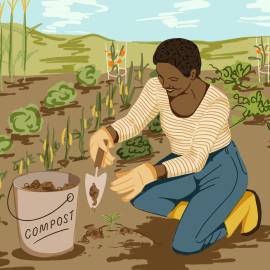
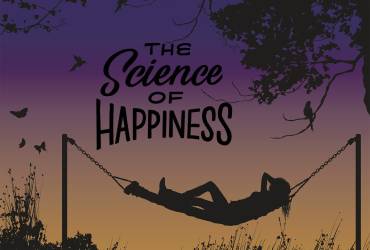
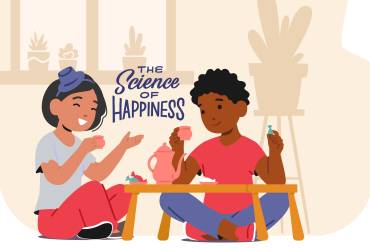
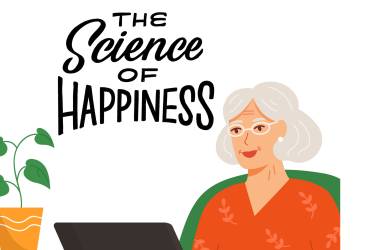
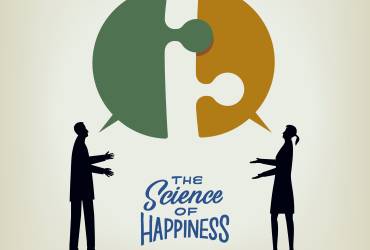
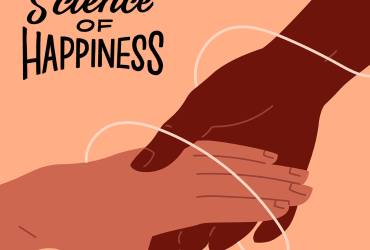
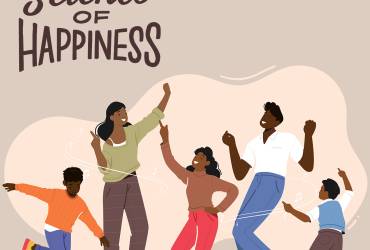
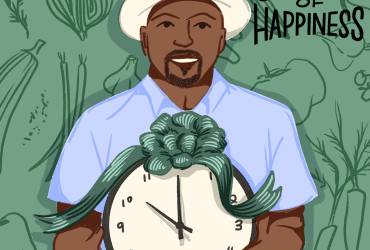

Comments